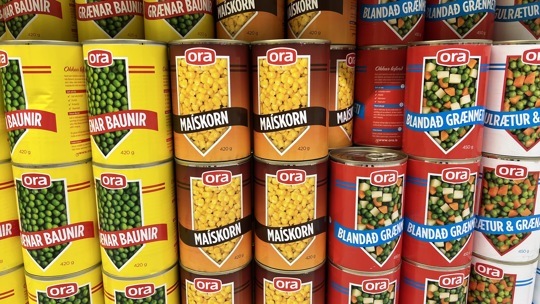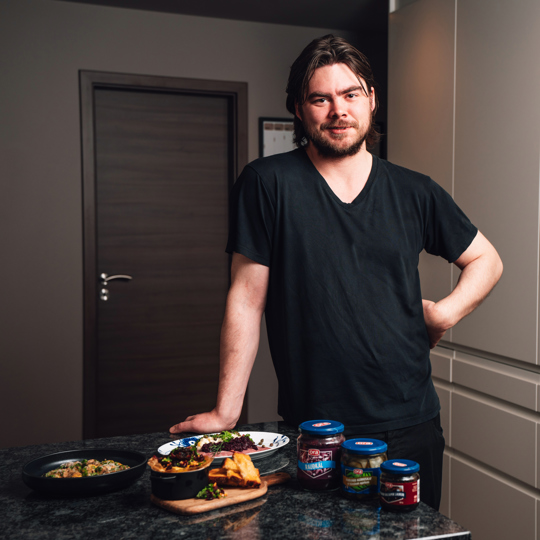Newsroom » News
What Is Smoked Lamb Without Green Peas? ORA Is the Trademark of the Month for November

02. December 2024
The trademark ORA has been an inseparable part of Icelandic food culture for over seven decades, and for many, the thought of Christmas without ORA’s products on the festive table is unthinkable. The company was founded in 1952 by Tryggvi Jónsson with the aim to make durable and wholesome Icelandic food products. Today, around 150 items are produced under the ORA brand, which is part of Myllan-ORA ehf. The word and figurative trademark ORA is the ISIPO’s
Trademark of the Month for November.
Many might assume that ORA is an acronym for a longer name that has faded into obscurity. However, ORA is, in fact, a Latin word meaning shore or coastline. In the context of intellectual property, ORA can be considered a suggestive trademark, hinting both at the sea—since the company was originally established to process and sell canned fish products—and Iceland as a coastal nation.
The Green Peas Are Dried Before Canning
Kjartan Óli Guðmundsson, product development manager at ORA, has been with the company since 2020. A trained chef, Kjartan also graduated as a product designer from the Iceland University of the Arts in 2016. His role at ORA allows him to combine his two passions: product design and culinary arts.

Kjartan notes that this time of year is naturally very busy for ORA. Sales always surge around Christmas and other holidays. "After all," he says, "what is smoked lamb without green peas or glazed ham without red cabbage and corn?"
Kjartan explains that ORA’s best-selling product, practically a trademark in its own right, is its canned green peas. He reveals that the unique taste and texture of the peas are rooted in a special process. The peas, canned in Kópavogur, are imported dried from the United States. This tradition dates back to the post-World War II rationing era when fresh or frozen green peas were hard to come by. Today, this drying process contributes to the distinct flavor of ORA peas. Kjartan shares that the company once attempted to replace the dried peas with frozen ones, but customers strongly objected, claiming the ORA flavor was missing. The company quickly decided to maintain this characteristic process.
Kjartan recalls one instance when he himself tried to serve non-canned peas at a Christmas buffet he prepared, before joining ORA. He was swiftly made aware this was not the guests’ liking and had to rush out to buy ORA peas to avoid a guest rebellion.
Canning: A Brilliant Preservation Method
When asked why he thinks ORA products are so popular, Kjartan points to nostalgia. "Taste is learned behavior, and we all remember and seek out flavors we grew up with," he says. ORA products have been a staple for Icelanders for decades. He also emphasizes the high quality of ORA’s food products, made from premium ingredients with minimal additives.
Kjartan believes that canned foods have unfairly earned a bad reputation as highly processed. This stigma may partly stem from the historical production of poor-quality canned foods that prioritized shelf life over flavor. However, he explains that canning is an ingenious preservation method: canned food is minimally processed, often contains few or no additives, and is highly nutritious. Some foods, such as stews, soups, and confit, even improve with canning. And for example, ORA’s fish pudding and fish balls are made from nearly pure fish with just a bit of potato starch as a binder. ORA also extensively uses aluminum cans, among the most environmentally friendly packaging available, as aluminum can be recycled indefinitely.
“People Have Strong Opinions About ORA Products”
"There is a strong tradition behind ORA products, and people have very definite opinions about them," says Kjartan.
ORA’s most popular products are canned green peas, corn, and herring. Kjartan notes that ORA corn is especially praised for its flavor. This may be partly because it is cooked slightly longer than other canned corn, making it softer. ORA also adheres to stricter safety and shelf-life standards than international norms require.
Regarding product development, the ORA brand sets certain boundaries. Some products, like canned tomatoes, are readily embraced by Icelanders, while others, such as soups, are less popular. Kjartan prefers focusing on developing high-quality products rather than competing with inexpensive imported canned goods. Recently, ORA introduced pickled onions, which have been very popular, as well as wild mushroom soup. Upcoming launches include meatballs in brown sauce and in tomato sauce.
It’s clear that although the ORA brand has been around for many years, it is continually evolving and will undoubtedly remain a festive table staple for Icelanders in the future.

Trademark V0013317 Registered in 1984
The word and figurative trademark ORA was registered in 1984 and is currently protected in Classes 29, 30, 31, and 32, covering goods such as meat, fish, preserved fruits, jams, and porridge. Its registration was last renewed on October 1, 2024.
ISIPO Staff Selects the Trademark of the Month
The Trademark of the Month initiative is inspired by similar programs at other Nordic and Baltic intellectual property offices. Its purpose is to highlight the importance of trademark registration and promote the activities of the Icelandic Intellectual Property Office. The staff selects the Trademark of the Month from newly registered or recently renewed Icelandic trademarks representing Icelandic goods and/or services. A good trademark, from an intellectual property perspective, must have clear distinctive characteristics, strong differentiation, and not be descriptive or likely to be confused with other marks. Most importantly, it should have an interesting backstory.